
Resources
Browse our full library of in-depth resources and publications
The PacWastePlus programme team is committed to producing meaningful and valuable publications and resources that provides guidance for improving waste management in the Pacific
Search
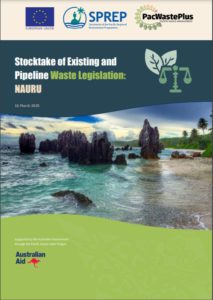
Waste Legislative Review
Stocktake of Existing and Pipeline Waste Legislation in Nauru
This report contains the University of Melbourne (UoM) team’s findings relating to a stocktake of the existing legislative environment for waste management in the participating countries, focusing on the PacWastePlus priority waste streams of healthcare waste, asbestos, e-waste, plastic waste, recyclables, organics, disaster waste, bulky waste and wastewater, and including implementing legislation for the following multilateral environmental agreements (MEAs): Waigani, Basel, Stockholm, Rotterdam, and Minamata. It also includes a stocktake of pipeline legislative initiatives in the participating countries, including an assessment of their impact and approximate timeframe for development. This report provides details on a stocktake of existing and pipeline Waste Legislations in Nauru.
File Size: 2MB, 12 pages PDF document
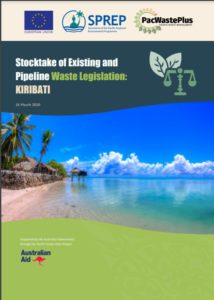
Waste Legislative Review
Stocktake of Existing and Pipeline Waste Legislation in Kiribati
This report contains the University of Melbourne (UoM) team’s findings relating to a stocktake of the existing legislative environment for waste management in the participating countries, focusing on the PacWastePlus priority waste streams of healthcare waste, asbestos, e-waste, plastic waste, recyclables, organics, disaster waste, bulky waste and wastewater, and including implementing legislation for the following multilateral environmental agreements (MEAs): Waigani, Basel, Stockholm, Rotterdam, and Minamata. It also includes a stocktake of pipeline legislative initiatives in the participating countries, including an assessment of their impact and approximate timeframe for development. This report provides details on a stocktake of existing and pipeline Waste Legislations in Kiribati.
File Size: 2MB, 14 pages PDF document
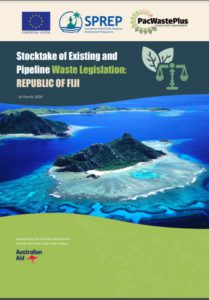
Waste Legislative Review
Stocktake of Existing and Pipeline Waste Legislation – Fiji
This report contains the University of Melbourne (UoM) team’s findings relating to a stocktake of the existing legislative environment for waste management in the participating countries, focusing on the PacWastePlus priority waste streams of healthcare waste, asbestos, e-waste, plastic waste, recyclables, organics, disaster waste, bulky waste and wastewater, and including implementing legislation for the following multilateral environmental agreements (MEAs): Waigani, Basel, Stockholm, Rotterdam, and Minamata. It also includes a stocktake of pipeline legislative initiatives in the participating countries, including an assessment of their impact and approximate timeframe for development. This report provides details on a stocktake of existing and pipeline Waste Legislations in Fiji.
File Size: 2MB, 14 pages PDF document
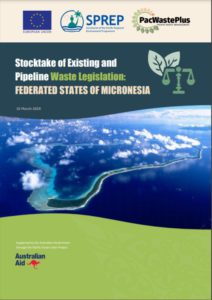
Waste Legislative Review
Stocktake of Existing and Pipeline Waste Legislation – Federated States of Micronesia
This report contains the University of Melbourne (UoM) team’s findings relating to a stocktake of the existing legislative environment for waste management in the participating countries, focusing on the PacWastePlus priority waste streams of healthcare waste, asbestos, e-waste, plastic waste, recyclables, organics, disaster waste, bulky waste and wastewater, and including implementing legislation for the following multilateral environmental agreements (MEAs): Waigani, Basel, Stockholm, Rotterdam, and Minamata. It also includes a stocktake of pipeline legislative initiatives in the participating countries, including an assessment of their impact and approximate timeframe for development. This report provides details on a stocktake of existing and pipeline Waste Legislations in the Federated States of Micronesia.
File Size: 2MB, 26 pages PDF document
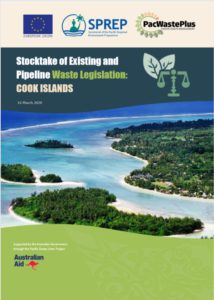
Waste Legislative Review
Stocktake of Existing and Pipeline Waste Legislation – Cook Islands
This report contains the University of Melbourne (UoM) team’s findings relating to a stocktake of the existing legislative environment for waste management in the participating countries, focusing on the PacWastePlus priority waste streams of healthcare waste, asbestos, e-waste, plastic waste, recyclables, organics, disaster waste, bulky waste and wastewater, and including implementing legislation for the following multilateral environmental agreements (MEAs): Waigani, Basel, Stockholm, Rotterdam, and Minamata. It also includes a stocktake of pipeline legislative initiatives in the participating countries, including an assessment of their impact and approximate timeframe for development. This report provides details on a stocktake of existing and pipeline Waste Legislations in the Cook Islands.
File Size: 2MB, 16 pages PDF document
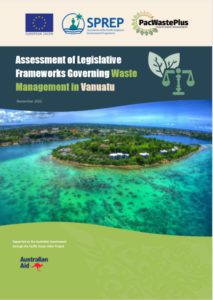
Waste Legislative Review
Assessment of Legislative Frameworks Governing Waste Management in Vanuatu
These assessments have been prepared by SPREP EU-funded PacWastePlus programme, drawing upon reporting developed by the University of Melbourne (UoM) on behalf of PacWastePlus for that programme’s Waste Legislative Review project. The UoM team reviewed legislation relevant to waste management in 14 Pacific region countries and Timor-Leste. Separate assessments are provided for each of the PacWastePlus participating countries. This report provides a detailed view of the legislative environment governing waste management currently in operation in Vanuatu.
File Size: 4.0MB, 62 pages PDF document
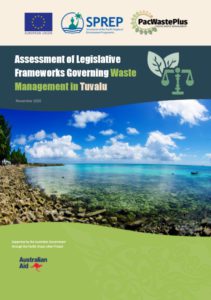
Waste Legislative Review
Assessment of Legislative Frameworks Governing Waste Management in Tuvalu
These assessments have been prepared by SPREP EU-funded PacWastePlus programme, drawing upon reporting developed by the University of Melbourne (UoM) on behalf of PacWastePlus for that programme’s Waste Legislative Review project. The UoM team reviewed legislation relevant to waste management in 14 Pacific region countries and Timor-Leste. Separate assessments are provided for each of the PacWastePlus participating countries. This report provides a detailed view of the legislative environment governing waste management currently in operation in Tuvalu.
File Size: 4.1MB, 65 pages PDF document
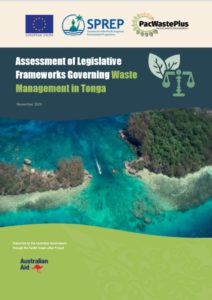
Waste Legislative Review
Assessment of Legislative Frameworks Governing Waste Management in Tonga
These assessments have been prepared by SPREP EU-funded PacWastePlus programme, drawing upon reporting developed by the University of Melbourne (UoM) on behalf of PacWastePlus for that programme’s Waste Legislative Review project. The UoM team reviewed legislation relevant to waste management in 14 Pacific region countries and Timor-Leste. Separate assessments are provided for each of the PacWastePlus participating countries. This report provides a detailed view of the legislative environment governing waste management currently in operation in Tonga.
File Size: 4.0MB, 60 pages PDF document
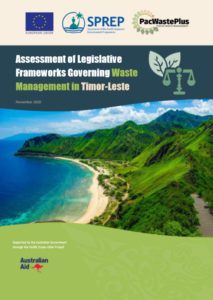
Waste Legislative Review
Assessment of Legislative Frameworks Governing Waste Management in Timor-Leste
These assessments have been prepared by SPREP EU-funded PacWastePlus programme, drawing upon reporting developed by the University of Melbourne (UoM) on behalf of PacWastePlus for that programme’s Waste Legislative Review project. The UoM team reviewed legislation relevant to waste management in 14 Pacific region countries and Timor-Leste. Separate assessments are provided for each of the PacWastePlus participating countries. This report provides a detailed view of the legislative environment governing waste management currently in operation in Timor-Leste.
File Size: 4.1MB, 62 pages PDF document
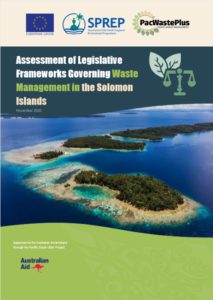
Waste Legislative Review
Assessment of Legislative Frameworks Governing Waste Management in Solomon Islands
These assessments have been prepared by SPREP EU-funded PacWastePlus programme, drawing upon reporting developed by the University of Melbourne (UoM) on behalf of PacWastePlus for that programme’s Waste Legislative Review project. The UoM team reviewed legislation relevant to waste management in 14 Pacific region countries and Timor-Leste. Separate assessments are provided for each of the PacWastePlus participating countries. This report provides a detailed view of the legislative environment governing waste management currently in operation in the Solomon Islands.
File Size: 4.0MB, 62 pages PDF document
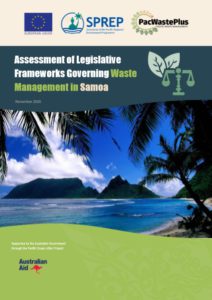
Waste Legislative Review
Assessment of Legislative Frameworks Governing Waste Management in Samoa
These assessments have been prepared by SPREP EU-funded PacWastePlus programme, drawing upon reporting developed by the University of Melbourne (UoM) on behalf of PacWastePlus for that programme’s Waste Legislative Review project. The UoM team reviewed legislation relevant to waste management in 14 Pacific region countries and Timor-Leste. Separate assessments are provided for each of the PacWastePlus participating countries. This report provides a detailed view of the legislative environment governing waste management currently in operation in Samoa.
File Size: 4.5MB, 66 pages PDF document
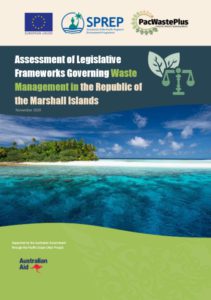
Waste Legislative Review
Assessment of Legislative Frameworks Governing Waste Management in Republic of Marshall Islands
These assessments have been prepared by SPREP EU-funded PacWastePlus programme, drawing upon reporting developed by the University of Melbourne (UoM) on behalf of PacWastePlus for that programme’s Waste Legislative Review project. The UoM team reviewed legislation relevant to waste management in 14 Pacific region countries and Timor-Leste. Separate assessments are provided for each of the PacWastePlus participating countries. This report provides a detailed view of the legislative environment governing waste management currently in operation in the Republic of Marshall Islands.
File Size: 3.9MB, 62 pages PDF document
Newsletter Subscription
Would you like to subscribe to our quarterly programme newsletter-The Connection?
We care about the protection of your data. Read our Privacy Policy.
Newsletter Signup
To sign up to our newsletter, enter the information below and we will add you to our mailing list for all future regional and project updates.
